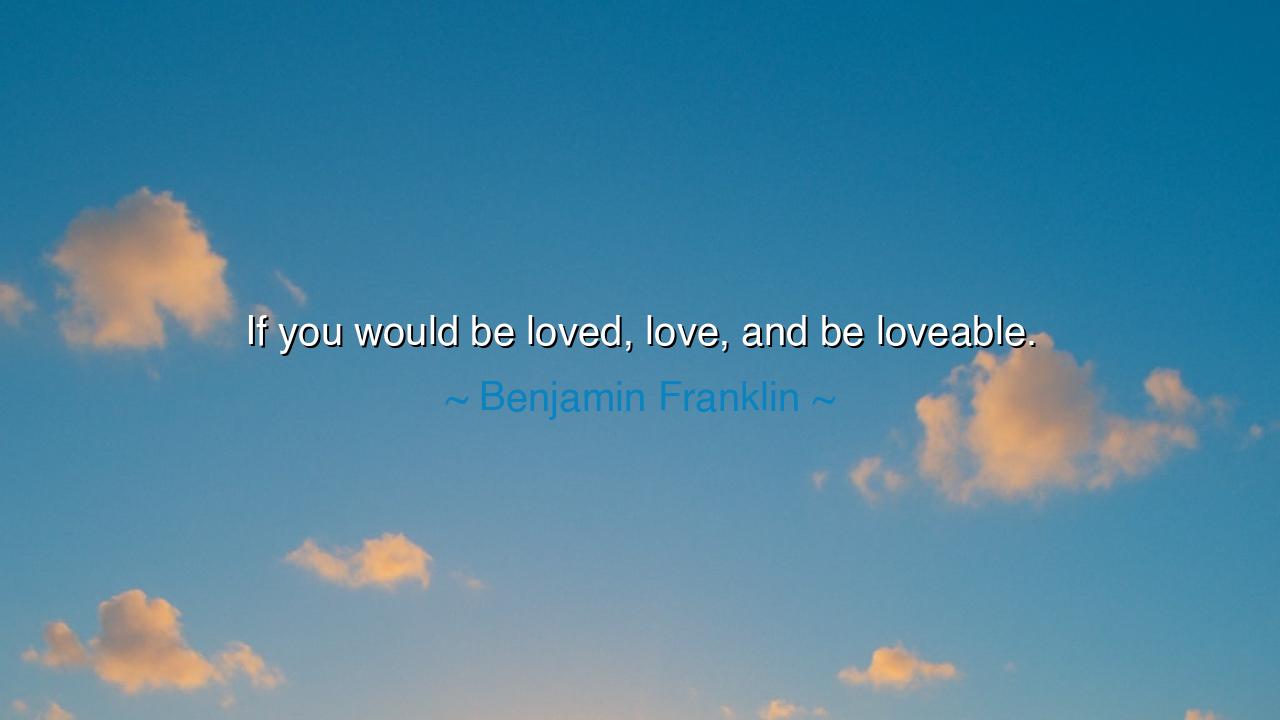
If you would be loved, love, and be loveable.






"If you would be loved, love, and be loveable." These words, spoken by the venerable Benjamin Franklin, capture a truth as old as time itself. Franklin, with his wisdom and wit, reminds us that love is not something we demand from others, nor is it something that can be taken by force. Love is earned and nurtured, not by waiting for it to come to us, but by offering it freely and becoming someone who is worthy of that love. To be loved, we must first love—not just in words, but through actions, through kindness, and through a genuine openness to others. And in this giving of love, we must also cultivate ourselves to be loveable, to embody the qualities that inspire affection and respect.
In the wisdom of the ancients, the notion of love was seen not merely as a feeling but as a virtuous force that can elevate both the lover and the beloved. Aristotle spoke of love in his works on ethics, recognizing that love stems from the soul’s pursuit of the good, the beautiful, and the true. Love, he taught, is not about possessing others but about recognizing their inherent worth and contributing to their flourishing. In this sense, love is an active force, one that requires not only affection but a commitment to growth, both of oneself and of those around us. Franklin’s quote echoes this ancient truth: to be loved, we must first give love, and we must work on becoming the kind of person who naturally attracts love through our deeds and character.
Consider the relationship between Marcus Aurelius, the great Roman emperor, and his teacher and mentor Junius Rusticus. Marcus, though destined for great power, always held a deep reverence for the wisdom of Rusticus, whose love and guidance shaped his moral and philosophical understanding. Rusticus’s love was not just for Marcus as a ruler, but for Marcus as a person, and it was this deep affection that helped Marcus become one of the greatest emperors in Roman history. Rusticus’s love was not conditional or transactional; it was rooted in a genuine desire for Marcus’s betterment and an ability to nurture the good within him. Through Rusticus’s love, Marcus became a man who deeply loved his people, and his reign is remembered as one of the most benevolent in history. This story reminds us that love is not only given to the deserving, but it also nurtures growth and virtue, enabling others to live out their fullest potential.
Similarly, in the life of Mother Teresa, we see the embodiment of Franklin’s wisdom in action. Throughout her life, she gave love tirelessly to those who were forgotten by the world—the poor, the sick, and the suffering. And in her giving, she received love in return. The world loved her not because she demanded it, but because she embodied love in everything she did. She showed us that love is not just a feeling—it is an action, a choice to give of oneself fully. Her love was palpable in every touch, every word, and every moment spent in service. It was this love that made her not only loveable but revered, and her legacy continues to inspire millions. Her life is a testament to the truth of Franklin’s words: to be loved, one must first give love, and in doing so, become a person whose very presence inspires affection and admiration.
Franklin’s insight also carries with it the importance of self-improvement in the pursuit of love. To be loveable is not about perfection but about cultivating the qualities that make us worthy of love—kindness, patience, empathy, and understanding. Love is not won through grand gestures alone but through everyday actions, through the way we treat others in both our moments of strength and our moments of vulnerability. It is through the small, meaningful connections we make with those around us that we become more loveable. It is the willingness to give love, even in times of difficulty, that shows the depth of our character and invites others to love us in return.
The lesson from Franklin’s words is clear: love is not a passive force that simply arrives on our doorstep; it is something we must actively nurture, both within ourselves and in our relationships. If we wish to be loved, we must first be willing to give love freely and work on becoming worthy of that love through our actions and character. We must create an environment where love can flourish—not just through the affection we offer but through the way we live our lives, the way we show up for others, and the way we care for ourselves.
In your own life, take this wisdom to heart: if you desire love, do not wait for it to come to you. Give love—not just to those who are easy to love, but to those who need it the most, to those who may not always show it in return. And in giving love, work on becoming the kind of person whose heart is open, whose actions are guided by kindness, and whose presence is a beacon of warmth and compassion. By doing so, you will find that love is not something you must seek, but something that naturally comes to you, for when you give love, you become the person who deserves it.






AAdministratorAdministrator
Welcome, honored guests. Please leave a comment, we will respond soon